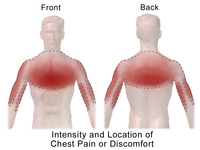
Photo from wikipedia
BACKGROUND On 31 December 2016, a total of 1206 physicians participated in the outpatient care of chronic pain patients according to the criteria of a special pain management program (QSV). Because… Click to show full abstract
BACKGROUND On 31 December 2016, a total of 1206 physicians participated in the outpatient care of chronic pain patients according to the criteria of a special pain management program (QSV). Because of the largely existing shortage of treatment resources for chronic pain patients, there is a lack of data regarding the evaluation of outpatient pain management by highly specialized pain therapists. METHODS In a hybrid Delphi procedure, a questionnaire concerning the content, structural and personal assessment of outpatient pain management in Germany was developed. With the help of this instrument, an internet-based cross-sectional survey of 281 QSV pain therapists from four German states (Berlin, Lower Saxony, Saxony, Baden-Württemberg) and of all the heads of university outpatient pain services (n = 36) in Germany was conducted. RESULTS The adjusted response rate of the survey was 35.9%. The response rate of the heads of university outpatient pain services was 66.7%. In 91% of the respondents the proportion of chronic pain patients in the medical practices was more than 70%. Whereas 67.3% were satisfied with the situation in their medical practice, 63.4% were dissatisfied with the current organizational structure of the pain management in Germany. They expressed their dissatisfaction especially in terms of budgeting regulations (69.3%), the cooperation with psychotherapists (69.3%) and interdisciplinary networking (50.5%). The 1‑year specialist training in pain management (87.1%) and the completion of a psychosomatic basic care course (90.1%) were assessed as a good preparation for the later profession. A multitude of free comments indicated that the pain specialist training is too short and insufficient. Most of the respondents considered the establishment of a specialist board certification for pain management more suitable from the perspective of physicians (61.4%) and the patients (54.5%). Of the heads of university outpatient pain services 70.8% expressed the wish for autonomous structures with separate budgets and 75.0% indicated that under the current conditions their outpatient pain services are not working profitably. Only 39.7% of the QSV pain therapists provided fellowship training for physicians and 57.6% were planning to retire during the next 10 years. CONCLUSION Highly specialized pain therapists are dissatisfied because of the lack of independence of the organizational structure of pain management care and the insufficient interdisciplinary network in outpatient pain management. A possible solution for a better pain management care and the recruitment problems may be the establishment of a board certification for pain management.
Journal Title: Schmerz
Year Published: 2020
Link to full text (if available)
Share on Social Media: Sign Up to like & get
recommendations!